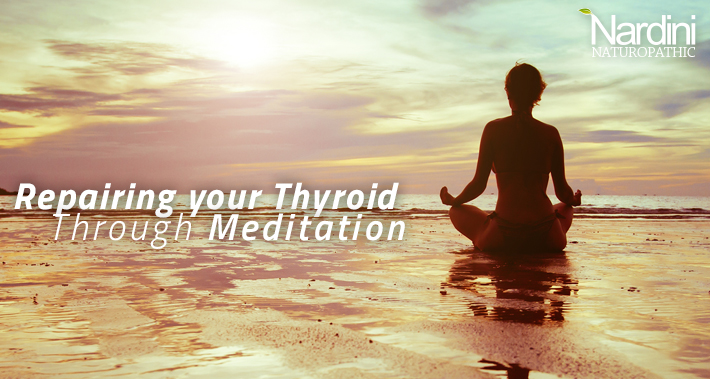You can’t avoid stress in life, from the common, every day sort of stress you experience when, for example, you’re late for work, to the deeper emotional issues from which anxiety and depression can stem.
But no matter what type of stress you’re dealing with, from your cardiovascular system to your brain, you’ll notice some changes in your physiology. One of the most important parts of your body affected by stress is your thyroid.
How Stress Affects The Thyroid
I’ve written about the things that can prevent your thyroid from working at its peak before, including stress.
When you’re feeling stressed out, no matter what the reason, the reaction starts in your stomach. Because your stomach doesn’t produce acid at the rate it normally does when you’re under stress, it won’t absorb nutrients at the rate it should, like selenium and zinc.
And because both selenium and zinc are crucial for thyroid health, you can see why this is bad news.
Your digestive tract also becomes less of a hospitable place for the healthy bacteria, which can start breaking down your intestinal barrier. This broken down barrier is a major risk for autoimmune diseases, including those that affect the thyroid, like Hashimoto’s thyroiditis and Graves’ disease.
But more than just holding back the nutrients it needs, stress also interferes with your body’s ability to create the hormones you need for your thyroid to work properly. It also depresses your HPA (hypothalamus-pituitary-adrenal) axis, which interferes with production of TSH, the thyroid stimulating hormone.
And since around 20% of your body’s thyroid hormones come from your digestive tract, the issues there affect your thyroid as well!
In short, stress wreaks havoc on your thyroid!
Does Meditation Help The Thyroid?
Now that you know what stress can do to your thyroid, what can you do about it?
Believe it or not, studies have shown that taking time to meditate can actually help lower the effects stress can have on your body. It also has benefits for other conditions too, like:
- High blood pressure
- Irritable Bowel Syndrome
- Ulcerative Colitis
- Anxiety
- Depression
- Insomnia
- Smoking Cessation
Because both ulcerative colitis and irritable bowel syndrome are linked to the digestive system, it seems like meditating can have a positive effect on it. And because your digestive tract is so important for protecting you from autoimmune diseases, meditation may help protect you from these as well.
Stress creates cortisol, which can get in your thyroid’s way. But meditation has been shown to reduce cortisol levels, which helps you get your thyroid back to where it should be.
So… how do you do it? How do you meditate? It’s not just as simple as sitting quietly, is it?
What Is Mindfulness Meditation?
Mindfulness meditation is simply about being in the moment. If you can clear your mind of the past and future, and focus only on the present moment, you’re practicing mindfulness meditation.
Ever since I started practicing mindfulness meditation, I’ve noticed my body has increased its capacity for healing. I’ve noticed my body temperature increase, my sleep improved, and my general demeanor calmer and more relaxed, just by meditating for around 20 minutes a day.
20 minutes a day may sound like a lot of time, but you can work yourself up to that. Start with smaller meditation sessions – even if you meditate for only five minutes a day you can notice a difference!
Five minutes. That’s about the same length as one of your favourite songs, or the amount of time you spend at the coffee shop in the morning. It’s a pretty small time investment for the returns you can experience!
Can you set aside five minutes a day for the sake of your health?
Until next time, this is Dr. Pat Nardini, ND, putting “Your Wellness First!”
Latest posts by Dr. Pat Nardini, ND (see all)
- How To Repair Your Thyroid Naturally Through Meditation - August 15, 2015
- Health Issues Caused By Poor Digestive Health - April 1, 2015
- Digestive Health Solutions - January 11, 2015













No Comments